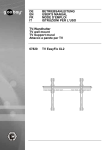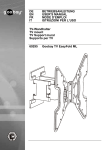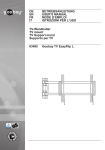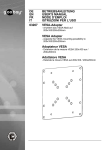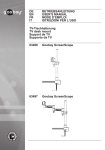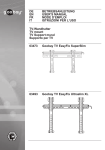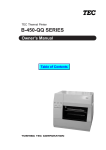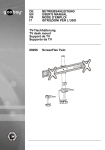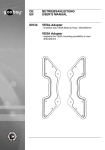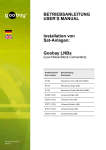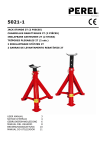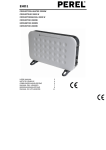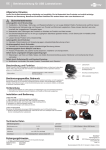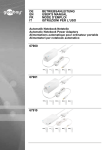Download DE EN FR IT BETRIEBSANLEITUNG USER'S
Transcript
DE EN FR IT BETRIEBSANLEITUNG USER‘S MANUAL MODE D‘EMPLOI ISTRUZIONI PER L‘USO TV-Wandhalter TV wall mount TV Support mural Supporto per TV 69242 TV EasyFold Corner Betriebsanleitung BETRIEBSANLEITUNG..............................................2 USER’S MANUAL........................................................16 MODE D‘EMPLOI........................................................28 ISTRUZIONI PER L‘USO.............................................42 BETRIEBSANLEITUNG Inhalt 1Sicherheitshinweise............................................................................3 1.1Allgemeines...................................................................................3 1.2Benutzergruppen...........................................................................4 1.3Warnstufen....................................................................................4 2Beschreibung und Funktion................................................................5 2.1Lieferumfang..................................................................................5 2.2benötigtes Werkzeug....................................................................6 3Bestimmungsgemäßer Gebrauch......................................................7 3.1Nutzungsbeschränkungen.............................................................7 4Montage .....................................................................................7 4.1 Vorbereitung............................................................................7 4.2 Wandmontage.........................................................................7 4.3 Flachbildschirmmontage.........................................................9 4.3.1 Flachbildschirme mit flacher Rückseite..................................9 4.3.2 Flachbildschirme mit gewölbter Rückseite..............................10 4.4Einhängen und Sichern des Flachbildschirms..............................10 4.5Gerätekabel verlegen....................................................................11 5Ausrichten des Flachbildschirms........................................................12 6Gewährleistung und Haftung..............................................................12 7 P flege, Wartung, Lagerung und Transport.........................................13 8Problembehebung..............................................................................13 9 Technische Daten...............................................................................14 10Informationen zum VESA-Standard...................................................14 11Entsorgungshinweise.........................................................................14 2 1 Sicherheitshinweise 1.1Allgemeines • Lesen Sie die beiliegende Produktdokumentation vollständig und sorgfältig vor Benutzung. Diese ist Bestandteil des Produkts. • Beachten Sie die Sicherheitshinweise in Produktdokumentation, auf Produkt und Zubehör, sowie auf der V erpackung. • Benutzen Sie Produkt, Produktteile und Zubehör nur in einwandfreiem Zustand. • Bewahren Sie die Produktdokumentation für andere potentielle Benutzer und zum Nachlesen auf. • Bei Fragen, Defekten, mechanischen Beschädigungen, Störungen und anderen nicht d urch die Begleitdokumentation behebbaren Problemen, wenden Sie sich an Ihren Händler. Lebensgefahr durch Ersticken Kinder können an verschluckten oder eingeatmeten Kleinteilen und Dämmmaterial ersticken. >> Kleinteile und Dämmmaterial gegen unbeabsichtigte Benutzung sichern. Verletzungsgefahr durch Stolpern und Sturz Ungünstig platzierte bzw. installierte Produkte können Personen verletzen. >> Produkt, Produktteile und Zubehör sicher platzieren, installieren und transportieren. >>Bei Arbeiten mit Lasten sich und den Arbeitsort sichern und von zweiter Person helfen lassen. >> Demontage-, Wartungs- und Reparaturarbeiten nur von Fachpersonal durchführen lassen. Verletzungsgefahr durch Schneiden Kinder können sich an Verpackungen schneiden. >> Kleinteile und Verpackungen gegen unbeabsichtigte Benutzung sichern. Verletzungsgefahr durch ungeeignete Umgebungsbedingungen Extreme Umgebungsbedingungen können Personen verletzen. >> Auf in der Wand liegende, stromführende K abel oder andere Leitungen achten und diese nicht beschädigen! >>Nicht an Stellen mit direkter Sonneneinstrahlung bzw. starkem Licht montieren. Dies fördert d as Ermüden der Augen. Verletzungsgefahr durch bewegliche Produktteile Bewegliche Produktteile können Gliedmaßen einklemmen oder quetschen. >>Gliedmaßen während des Gebrauchs nicht zwischen Scherteile halten. >> Während des Gebrauchs auf die Beweglichkeit des Produktes achten. Dieses kann sich von der Wand weg oder auf sie zu bewegen und seitlich ausschwenken. Gefahr durch Selbsteingriffe und Zweckentfremdung 3 Betriebsanleitung Selbsteingriffe und Zweckentfremdungen bergen unvorhersehbare Risiken und führen zum Erlöschen von Gewährleistungs- und Garantieansprüchen. >> Modifizieren und ändern Sie weder Produkt, P roduktteile noch Zubehör! Sachschaden durch inkompatible Produktkombinationen Inkompatible Produktkombinationen erfüllen nicht die gewünschte Funktion, können Qualitätsverluste oder Sachschaden zur Folge haben. >> Technische Daten aller verwendeter P rodukte vergleichen. Diese müssen übereinstimmen oder im angegebenen Bereich liegen. Sachschaden durch ungeeignete Umgebungsbedingungen Falsche Umgebungsbedingungen können Sachen beschädigen. >> Belastungen, wie Hitze und Kälte, Nässe u nd d irekte Sonneneinstrah- lung sowie Vibrationen und m echanischen Druck vermeiden. >>Um Quell- und Ausgabegeräte sowie um Schwenk- und Neigebereich ausreichend Platz für gute Belüftung und Beweglichkeit lassen. Das mitgelieferte Montagematerial ist ausschließlich für die Montage an massiven Stein- und Betonwänden geeignet. >>Bei abweichender Beschaffenheit geeignetes Montagematerial nutzen. >> S tabilität des Systems nach Montage regelmäßig prüfen. 1.2Benutzergruppen Aufgrund unterschiedlich hoher Risiken und Gefahrenpotentiale dürfen einige Arbeitsschritte nur von geschulten Fachkräften ausgeführt werden. Arbeitsschritt Benutzergruppe Montage, Demontage, Ausrichten, Pflege, Lagerung, Transport, Entsorgung Endverbraucher und Benutzer mit mechanischen Grundkenntnissen >> Von Kindern und Personen mit eingeschränkten geistigen und motorischen Fähigkeiten fernhalten und gegen Benutzung sichern! Wartung, Reparatur Geschulte Fachkräfte >> Spezielle Sicherheitsmaßnahmen, Fachwissen und Werkzeuge nötig! Tab. 1: Benutzergruppen 1.3Warnstufen Warnung vor Gefahren, die bei Missachtung der Sicherheitshinweise unmittelbar zu Tod oder schweren Verletzungen führen. Warnung vor Gefahren, die bei Missachtung der Sicherheitshinweise zu Tod oder schweren Verletzungen führen können. 4 Warnung vor Gefahren, die bei Missachtung der Sicherheitshinweise zu Verletzungen führen können. Warnung vor Gefahren, die bei Missachtung der Hinweise zu Sachschäden führen können. 2 Beschreibung und Funktion Ihr TV-Wandhalter dient der Montage Ihres Flachbildschirms an stabilen, vertikalen Wänden. Die Doppelflügel-Bauart vereint Gewichtsersparnis und Stabilität. Der TV-Wandhalter ist mit Wasserwaage ausgestattet, vertikal neigbar, horizontal schwenkbar und speziell für die Eckmontage geeignet. 2.1Lieferumfang Teil Abbildung Kürzel Anzahl A 1 Wandschraube 6.3x55 W-A 6 Betondübel W-B 6 Unterlegscheibe D6 W-C 6 B 2 M5x14 M-A 4 M6x14 M-B 4 M8x20 M-C 4 Wandmontage TV-Wandhalter Flachbildschirmmontage Adapterhalterung 5 Betriebsanleitung M6x30 M-D 4 M8x30 M-E 4 Unterlegscheibe M-F 4 TV-Abstandhalter M-G 8 TV-Abstandhalter M-H 4 Tab. 2: Lieferumfang 2.2 benötigtes Werkzeug Werkzeug Leitungsprüfer Stift Kreuzschlitz-Schraubendreher Bohrmaschine Beton-/Steinbohrer 8x60mm zweite Person Tab. 3: benötigtes Werkzeug 6 Abbildung 3 Bestimmungsgemäßer Gebrauch Dieses Produkt dient dazu, Flachbildschirme mit spezifischen Bildschirmdiagonalen, Gewichten und Befestigungspunkten, die in Kapitel „technische Daten“ zusammengefasst sind, an eine vertikale Wand zu montieren. Eine andere als in Kapitel „Beschreibung und Funktion“ beschriebene Verwendung ist nicht gestattet. Das Nichtbeachten und Nichteinhalten dieser Bestimmungen und der Sicherheitshinweise kann zu schweren Unfällen, Personen- und Sachschäden führen. Beachten Sie dazu auch das Kapitel „Gewährleistung und Haftung“. 3.1Nutzungsbeschränkungen Nur in trockenen Innenräumen verwenden. 4 Montage 4.1 Vorbereitung Vollständigkeit und Unversehrtheit prüfen >>Packungsinhalt mithilfe des Lieferumfangs auf Vollständigkeit und Unversehrtheit kontrollieren. Kompatibilität sicherstellen Warnstufe Sicherheitshinweis Gebot / Verbot Sachschaden durch inkompatible Produktkombinationen >> Technische Daten aller verwendeter Produkte vergleichen. Diese müssen übereinstimmen oder im angegebenen Bereich liegen. Tab. 4: Kompatibilität sicherstellen 4.2 Wandmontage Warnstufe Sicherheitshinweis Gebot / Verbot Verletzungsgefahr durch ungeeignete Umgebungsbedingungen >> >> >> Wandstruktur vor Montage überprüfen bzw. sichere Stelle zur Montage auszuwählen. Auf in der Wand liegende, stromführende Kabel oder andere Leitungen achten und diese nicht beschädigen! Nicht an Stellen mit direkter Sonneneinstrahlung bzw. starkem Licht montieren. Dies fördert das Ermüden der Augen. 7 Betriebsanleitung Sachschaden durch ungeeignete Umgebungsbedingungen >> Um Quell- und Ausgabegeräte sowie um Schwenk- und Neigbereich ausreichend Platz für gute Belüftung und Beweglichkeit lassen. Tab. 5: Wandmontage 1. Prüfen Sie vor dem Bohren, ob sich Gas-, Wasser-, oder Stromleitungen in der Wand befinden und beschädigen Sie diese nicht. 2. Benutzen Sie eine Wasser- waage um die Bohrlöcher zu Fig. 1: Ausrichten und Anzeichnen markieren. 3.Markieren Sie die Bohrlöcher 1 bis 6 mit einem Stift. Der TV-Wandhalter (A) dient als Schablone. 4. Bohren Sie die Löcher mit einem 10mm-Steinbohrer 60mm tief. Fig. 2: Löcher bohren 5. Stecken Sie jeweils einen Wanddübel (W-B) in die Bohrlöcher. 6. Bringen Sie den TV Wandhal- ter (A) mit den Wandschrau- ben (W-A) und Unterlegschei- ben (W-C) so an, dass der Pfeil nach oben zeigt. Fig. 3: Wandmontage 8 4.3Flachbildschirmmontage Warnstufe Sicherheitshinweis Gebot / Verbot Verletzungsgefahr durch Stolpern und Sturz >> Produkt, Produktteile und Zubehör sicher platzieren, installieren und transportieren. Sachschaden durch ungeeignete Vorgehensweise >> Beim Anziehen von Schrauben mäßige Kraft aufwenden, um Gewinde nicht zu beschädigen. >> Flachbildschirm NIE flach auf den Boden legen. Flachbildschirm nicht durch zu lange Schrauben beschädigen. >> Tab. 6: Flachbildschirmmontage 4.3.1 Flachbildschirme mit flacher Rückseite 1. Lehnen Sie den Flachbild- schirm vertikal gegen eine weiche, großflächige Unterla- ge oder eine Wand und sichern Sie ihn gegen Kratzer und Umkippen. Fig. 4: Flachbildschirme mit flacher Rückseite 1 2. Montieren Sie die Adapterhal- terungen (B) mit den zu Ihrem Flachbildschirm passenden B Unterlegscheiben (M-F) und Schrauben an der FlachbildB schirmrückseite. Fig. 5: Flachbildschirme mit flacher Rückseite 2 Mit Pfeilen gekennzeichnete Teile immer nach oben zeigend ausrichten. 9 Betriebsanleitung 4.3.2 Flachbildschirme mit gewölbter Rückseite 1. Lehnen Sie den Flachbild- schirm vertikal gegen eine weiche, großflächige Unterla- ge oder eine Wand und sichern Sie ihn gegen Kratzer und Umkippen. Fig. 6: Flachbildschirme mit gewölbter Rückseite 1 2.Montieren Sie die Adapterhal- B terungen (B) mit den zu Ihrem Flachbildschirm passenden B Unterlegscheiben (M-F), Schrauben und TV-Abstand haltern an der Flachbild schirmrückseite. Fig. 7: Flachbildschirme mit gewölbter Rückseite 2 Mit Pfeilen gekennzeichnete Teile immer nach oben zeigend ausrichten. 4.4 Einhängen und Sichern des Flachbildschirms Warnstufe Sicherheitshinweis Verletzungsgefahr durch Stolpern und Sturz >> >> Produkt, Produktteile und Zubehör sicher platzieren, installieren und transportieren. Bei Arbeiten mit Lasten sich und den Arbeitsort sichern und von zweiter Person helfen lassen. Sachschaden durch ungeeignete Umgebungsbedingungen >> Tab. 7: Einhängen des Flachbildschirms 10 Um Quell- und Ausgabegeräte sowie um Schwenk- und Neigebereich ausreichend Platz für gute Belüftung und Beweglichkeit lassen. Gebot / Verbot 1.Hängen Sie den mit den Adapterhalterungen (B) ver bundenen Flachbildschirm zusammen mit einer 2. Person auf den TV-Wandhal- 1 ter (A). Bei Bedarf müssen hierzu die Fig. 8: Einhängen des Flachbildschirms Sicherungsschrauben 1 leicht gelockert werden. 2.Sichern Sie den Flachbild schirm, indem Sie beide Sicherungsschrauben 1 im Uhrzeigersinn fest anziehen. Diese sind jeweils an der Unterseite der Adapterhalte rungen (B) vormontiert. Fig. 9: Sichern des Flachbildschirms 4.5 Gerätekabel verlegen Warnstufe Sicherheitshinweis Gebot / Verbot Verletzungsgefahr durch bewegliche Produktteile >> >> Gliedmaßen während des Gebrauchs nicht zwischen Scherteile halten. Während des Gebrauchs auf die Beweglichkeit des Produktes achten. Dieses kann sich von der Wand weg oder auf sie zu bewegen und seitlich ausschwenken. Tab. 8: Gerätekabel verlegen Achten Sie bei der Kabelauswahl auf g enügend Spiel, damit der Flachbildschirm beweglich bleibt. Ende der Montage. Zur Demontage gehen Sie in rückwärtiger Reihenfolge vor. 11 Betriebsanleitung 5 Ausrichten des Flachbildschirms Warnstufe Sicherheitshinweis Gebot / Verbot Verletzungsgefahr durch bewegliche Produktteile >> >> Gliedmaßen während des Gebrauchs nicht zwischen Scherteile halten. Während des Gebrauchs auf die Beweglichkeit des Produktes achten. Dieses kann sich von der Wand weg oder auf sie zu bewegen und seitlich ausschwenken. Tab. 9: Ausrichten des Flachbildschirms 1. Richten Sie den Flachbild- schirm nach Bedarf >> vertikal, >> horizontal und/oder >> in der Rotationsachse aus. Fig. 10: Ausrichten des Flachbildschirms 6 Gewährleistung und Haftung • Der Hersteller gewährt auf ein neues Produkt 2 Jahre gesetzliche Gewähr- leistung. • Da der Hersteller keinen Einfluss auf die Installation des Produktes hat, deckt die Gewährleistung nur das Produkt selbst ab. • Falls ein Fehler oder Defekt an Ihrem Gerät festgestellt werden sollte, wenden Sie sich bitte an Ihren Fachhändler und zeigen Sie ggf. Ihre Quittung oder Rechnung als Kaufnachweis vor. Ihr Händler wird den Fehler entweder vor Ort beheben, oder das Produkt an den Hersteller weiterleiten. Sie erleichtern den Technikern ihre Arbeit sehr, wenn Sie eventuelle Fehler ausführlich beschreiben – nur dann haben Sie Gewähr, dass auch selten auftretende Fehler mit Sicherheit gefunden und beseitigt werden! • Der Hersteller haftet nicht für Personen- oder Sachschäden, die durch unsachgemäße Installation, Betrieb oder Wartung entstanden sind. • Ein anderer als in dieser Betriebsanleitung beschriebener Einsatz ist unzulässig und führt zu Gewährleistungsverlust, Garantieverlust und Haftungsausschluss. • Druckfehler und Änderungen an Gerät, Verpackung oder Dokumentation behalten wir uns vor. 12 7 Pflege, Wartung, Lagerung und Transport • Das Produkt darf nur von einer Fachwerkstatt gewartet werden. • Schützen Sie die Gelenke vor Schmutz und schmieren Sie diese regelmäßig mit leichtem Maschinenöl. • Reinigen Sie es nur mit einem trockenen, weichen Tuch. Gehen Sie beim Reinigen vorsichtig vor, um Kratzer zu vermeiden. Bei starken Verschmut- zungen kann das R einigungstuch leicht mit Wasser angefeuchtet werden. Setzen Sie keine Reinigungsmittel oder Chemikalien ein, da dies das Material angreifen kann. • Achten Sie beim Bewegen der Geräteteile darauf, dass Sie keine Körperteile darin einklemmen! • Kontrollieren Sie regelmäßig alle Befestigungen und Schrauben auf festen Sitz und ziehen Sie diese bei Lockerung wieder fest. Wenden Sie aber nicht zu viel Kraft an, um die Gewinde nicht zu überlasten. • Vermeiden Sie Stellen mit hohen Temperaturen und Feuchtigkeit, bzw. Stellen, die nass werden können, auch bei Wartung, Pflege, Lagerung und Transport. • Lagern Sie Ihr Produkt bei längerem Nichtgebrauch für Kinder unzugänglich und in trockener und staubgeschützter Umgebung. • Befestigungsbohrungen können sichtbar bleiben, wenn das Produkt demon- tiert w ird. Nach längerem Gebrauch kann ein Fleck auf dem Untergrund zurückbleiben. • Heben Sie die Originalverpackung für den Transport auf, um Schäden zu vermeiden. 8 Problembehebung Problem Wie kann die Wandqualität getestet werden? Hilfe Verkehrslasten für Wohnräume sind in diversen Europarichtlinien festgelegt. >> >> Wandstärke und Material unter Putz / Tapeten prüfen. Fachpersonal zu Rate ziehen. >> Kapitel 4.2 lesen. Der TV-Wandhalter lässt sich schwer ausrichten. >> >> Gelenke etwas lockern. Die maximale Schwenkbarkeit kann bedingt durch die TV Größe kleiner sein, als angegeben. andere Fragen >> Händler kontaktieren. Welche Löcher müssen gebohrt werden? Tab. 10: Problembehebung 13 Betriebsanleitung 9 Technische Daten Größe Angabe Einheit TV Größe 37-63 “ / Zoll VESA 200x200 / 300x300 / 400x200 / 400x400 / 600x400 / 800x400 mm Traglast max. 60 kg Neigungswinkel +/-15 ° Schwenkwinkel +/-60 ° Rotationswinkel +/-5 ° Wandabstand 125-515 mm Maße 858x440x125-515 mm Gewicht 9.25 kg Tab. 11: Technische Daten 10 Informationen zum VESA-Standard Um die Befestigungsmöglichkeiten von Monitoren, TV-Geräten und deren Ständer und TV-Wandhalter benutzerfreundlich zu vereinheitlichen, hat die VESA (Video Electronic Standard Assoziation) für die oben genannten Anwendungen 3 Standards festgelegt. Mit Hilfe des auf Ihrem Anzeigegerät oder in dessen Betriebsanleitung stehenden jeweiligen VESA-Standards und den technischen Daten in dieser Anleitung können Sie die möglichen Befestigungspunkte definieren. Einige Modelle lassen eine stufenlose, individuelle Befestigung zu. (z.B. 300 x 300mm für Sony TVs). VESA Klasse Befestigungslochabstand von Flachbildschirmen MIS-D 75x75 / 100x100mm MIS-E 200x100 / 200x200mm MIS-F 400x200 / 400x400 / 600x200 / 600x400 / 800x400mm Tab. 12: Informationen zum VESA-Standard 11 Entsorgungshinweise Dieses Produkt gehört nicht in den Hausmüll. Bitte geben Sie Ihr Gerät am Ende seiner Lebensdauer an die dafür eingerichteten, öffentlichen Sammelstellen oder an die Verkaufsstelle kostenlos zurück. Einzelheiten zur Entsorgung regelt das jeweilige Landesrecht. Wertstoffe werden dem Recyclingkreislauf zugeführt, um daraus neue Rohstoffe zu gewinnen. Folgende Wertstoffe werden in kommunalen Sammelstellen gesammelt: • Altglas, Kunststoffe, Altmetalle, Bleche uvm. 14 Mit dieser Art der Verwertung von Altgeräten leisten Sie einen wichtigen Beitrag zum Schutz unserer Umwelt. 15 User‘s Manual BETRIEBSANLEITUNG..............................................2 USER’S MANUAL........................................................16 MODE D‘EMPLOI........................................................28 ISTRUZIONI PER L‘USO.............................................42 USER’S MANUAL Content 1 Safety Instructions.................................................................... 17 1.1 General Notes............................................................... 17 1.2 User Groups.................................................................. 18 1.3 Warning Levels.............................................................. 18 2 Description and Function.......................................................... 19 2.1 Scope of Delivery.......................................................... 19 2.2 Required tools...............................................................20 3 Intended Use.............................................................................20 3.1 Use restrictions..............................................................20 4Installing.................................................................................... 21 4.1 Preparing....................................................................... 21 4.2 Wall mounting................................................................ 21 4.3 Mounting the flat screen................................................22 4.3.1 Flat screens with flat back.............................................23 4.3.2Flat screens with arched back.......................................23 4.4 Attaching the flat screen................................................24 4.5 Laying the cables.......................................................... 24 5 Aligning the flat screen.............................................................25 6 Warranty and Liability...............................................................25 7 Maintenance, Care, Storage and Transport.............................26 8 Troubleshooting........................................................................26 9 Specifications...........................................................................26 10 Information for VESA standard.................................................27 11 Disposal Instructions................................................................27 16 1 Safety Instructions 1.1 General Notes • Read the including product documentation completely and carefully before use. It is part of the product. • Attend to the safety instructions in product documentation, on product and accessories, such as on the package. • Use product, product parts and accessories only in perfect condition. • Keep the product documentation for other potential users and for later requests. • For questions, defects, mechanical damage, disturbances and other not remediable problems, c onsult your dealer. Risk of life by suffocating Children can suffocate by swallowed or inhaled p arts and insulation materials. >> Protect small parts and insulation material against unintentionally use. Risk of injury by tripping and falling Unfavorable placed or installed products and c able connections can injure persons. >> Place, transport and install product, parts and acceories in a safe way. >> When working with burdens, secure yourself and the working place, let a second p erson help you. >> Let only a specialist do disassembly, maintenance and repair work. Risk of injury by cutting Children can cut themselves on packaging materials. >> Protect packaging materials against unintentionally use. Risk of material damage by improper product combination Incompatible product combination does not fulfill required functions, can cause quality losses or material damage. >> The specifications of all used products must match or be within the specified range. Risk of injury by inappropriate ambient conditions Extreme conditions can injure persons. >> Attend to live cables or other lines lying behind plaster, and do not damage them! >> Do not install the product to places with direct sunlight or bright light. This c ontributes to eye fatigue. Risk of injury by moving product parts Moving product parts can pinch or squeeze limbs. >> Do not hold limbs between shear parts during use. >> Mind the mobility of the product during use. This may move away from the wall or towards it and swivel sideways. 17 User‘s Manual Risk of self-intervention and misuse Self-interventions and misuse hide unpredictable risks and cause expiration of warranty. >> Do not modify or alter either the product or the accessories! Risk of material damage by inappropriate ambient conditions Incorrect ambient conditions can damage things. >> Avoid extreme conditions, such as extreme heat, coldness, humidity or direct exposure to the sun, a s well as vibrations and mechanical pressure. >> Keep enough space around product and to the whole system to ensure proper ventilation and mobility. The included mounting material is only suitable for mounting on massive stone or concrete walls. >>For other wall types use suitable mounting material. >>Check the stability of the system periodically after installation. 1.2 User Groups Caused to different risk levels and hazard potentials some working steps only may be done by trained specialists. Working step User Group Installing, Uninstalling, Aligning, Care, Storage, Transport, Disposal Consumers and users with basical mechanical knowledge can do this work. >> Protect children and people with mental and motoral impairments from using the product! Maintenance, Repairing Trained specialists only >> special safety measures, knowledge and tools are necessary! Tab. 13: User Groups 1.3 Warning Levels Warnings against hazards that will result directly in serious injuries or death in case of non-observance. Warnings against hazards that may result in serious injuries or death in case of nonobservance. Warnings against hazards that may result in injuries in case of non-observance. Warnings against hazards that may result in material damage in case of 18 non-observance. 2 Description and Function Your TV wall mount is made for mounting your flat screen at stable, vertical walls. The double wing design combines weight saving and stability. The TV wall mount comes with water level, is vertically and horizontally swivelable and specially suited for corner installation. 2.1 Scope of Delivery Part Figure Symbol Amount A 1 Wall screw 6.3x55 W-A 6 Concrete anchor W-B 6 Washer D6 W-C 6 B 2 M5x14 M-A 4 M6x14 M-B 4 M8x20 M-C 4 M6x30 M-D 4 M8x30 M-E 4 Washer M-F 4 TV Spacer M-G 8 Wall mounting TV Wall mount Flat screen mounting Adapter bracket 19 User‘s Manual TV Spacer M-H 4 Tab. 14: Scope of Delivery 2.2 Required tools Tool Figure Line tester Pencil Phillips screwdriver Drilling mashine Concrete drill 8x60mm Second person Tab. 15: Required tools 3 Intended Use This product is made for mounting flat screens with specific screen sizes, weights and mounting points, which are summarized in chapter “Technical data“, on a vertical wall. Another use than described in chapter “Description and Function“ is not permitted. Neglegting and ignoring these regulations and safety instructions can cause serious accidents, personal injury and material damage. Also refer to chapter “Warranty and Liability“. 3.1 Use restrictions Only use in dry interior rooms. 20 4 Installing 4.1 Preparing Checking the completeness and integrity >>Check the packing content by comparing it to the scope of delivery regarding completeness and integrity. Ensuring compatibility Warning level Bid / Ban Safety instruction Risk of material damage by improper product combination >> The specifications of all used products must match or be within the s pecified range. Tab. 16: Ensuring compatibility 4.2 Wall mounting Warning level Safety instruction Bid / Ban Risk of injury due to inappropriate ambient conditions >> >> >> Check the wall structure before installing or choose a safe installation place. Attend to live cables or other lines lying behind plaster, and do not damage them! Do not install the product to places with direct sunlight or bright light. This contributes to eye fatigue. Risk of material damage by inappropriate ambient conditions >> Keep enough space around product and to the whole system to ensure proper ventilation and mobility. Tab. 17: Wall mounting 21 User‘s Manual 1. Before drilling, attend to live cables or other lines lying behind plaster, and do not damage them. 2. Use a spirit level to mark the drill holes on the wall. 3.Mark the drill holes 1 to 6 with Fig. 11: Aligning and marking a pencil. Use the wall plate (A) as template. 4. Drill the drill holes with a 10mm concrete drill 60mm deep. Fig. 12: Drilling drill holes 5. Plug a concrete anchor (W-B) in each drilling hole. 6. Attach the TV wall bracket (A) with the wall screws (W-A) and washers (W-C) in a way, that the arrow is pointing up. Fig. 13: Wall mounting 4.3 Mounting the flat screen Warning level Safety instruction Risk of injury by tripping and falling >> Place, transport and install product, parts and acceories in a safe way. Risk of material damage by improper procedure >> Only use moderate force when tightening the screws in order to avoid damaging threads. >> NEVER set the screen on the front during installation! Do not damage the flat screen by too long screws. >> Tab. 18: Mounting the flat screen 22 Bid / Ban 4.3.1 Flat screens with flat back 1. Lean the flat screen vertically on a soft, large surface or a wall and protect it of scratches and overturning. 2.Attach the adapter brackets (B) with washers (M-F) and screws, fitting to your flat screen to the flat screens B back. B Fig. 14: Flat screens with flat back 1 Align parts with arrow pointing up. Fig. 15: Flat screens with flat back 2 4.3.2Flat screens with arched back 1. Lean the flat screen vertically on a soft, large surface or a wall and protect it of scratches and overturning. Fig. 16: Flat screens with arched back 1 B B 2.Attach the adapter brackets (B) with washers (M-F), screws and TV spacers to the flat screen. Align parts with arrow pointing up. Fig. 17: Flat screens with arched back 2 23 User‘s Manual 4.4 Attaching the flat screen Warning level Safety instruction Bid/Ban Risk of injury by tripping and falling >> >> Place, transport and install product, parts and acceories in a safe way. When working with burdens, secure yourself and the working place, let a second person help you. Risk of material damage by inappropriate ambient conditions >> Keep enough space around product and to the whole system to ensure proper ventilation and mobility. Tab. 19: Attaching the flat screen 1. Attach the flatscreen with the adapter brackets (B) to the TV wall mount (A) together with a second person. Therefor, the screws 1 must be Fig. 18: Attaching the flat screen loosened slightly, as needed. 2. Secure the flat screen by tightening both screws 1 clock wise. These are pre-assem- bled on the underside of the adapter brackets (B). Fig. 19: Securing the flat screen 4.5 Laying the cables Warning level Safety instruction Risk of injury by moving product parts >> >> Tab. 20: Laying the cables 24 Do not hold limbs between shear parts during use. Mind the mobility of the product during use. This may move away from the wall or towards it and swivel sideways. Bid/Ban Select sufficiently long cables to ensure mobility of the flat screen. End of installing. To remove, proceed in reversed order. 5 Aligning the flat screen Warning level Safety instruction Bid/Ban Risk of injury by moving product parts >> >> Do not hold limbs between shear parts during use. Mind the mobility of the product during use. This may move away from the wall or towards it and swivel sideways. Tab. 21: Aligning the flat screen Align the flat screen as needed >> vertically >>horizontally and/or >>in rotation axis Fig. 20: Aligning the flat screen 6 Warranty and Liability • • • • • • • he producer grants a 2 years warranty to a new device. T As the manufacturer has no influence on installation, warranty only applies to the product itself. If any fault or damage is detected on your device, please contact your dealer and provide your sales slip or invoice as evidence of the purchase, if necessary. Your dealer will repair the fault either on site, or send the device to the manufacturer. You make the work of our technicians considerably easier, describing possible faults in detail – only then you can be assured that faults, occurring only rarely, will be found and repaired with certainty! The manufacturer is not liable for damages to persons or property caused by improper installation, operation or maintenance, not described in the manual. Do not alter or modify the product or its accessories. Any use other than described in this user`s manual is not permitted and causes loss of warranty, loss of guarantee, and non-liability. We reserve our right for misprints and changes of the device, packing, or user`s manual. 25 User‘s Manual 7 Maintenance, Care, Storage and Transport • • • • • • • • • The product must be maintained only by professional workshops. Protect the angles from dirt and grease them regularly with light machine oil. Use a dry and soft cloth to clean your product. Be careful to avoid scratches. Use a slightly moist cloth for heavy stains. Look out for live cables! Do not use any cleaning supplies. This can cause burns to the materials. Avoid liquid entry to the device. Make sure no body parts will be pinched in the swivel device, when parts of the device are moved! Periodically check, if all attachments and screws are secured, and tighten them again when they are loosened. This may be caused e.g. by frequent movements. Do not overtighten screws. Avoid places with high temperatures, humidity, or places which can become wet, also during maintenance, care, storage, and transport. Keep the product away from children and store it at dry and dust-proof places! Drill holes are still visible after removing the product. After use for a longer time period, a spot may remain on the surface. Keep the original packing for transport and to avoid damages. 8 Troubleshooting Problem How to test wall quality? Help Loads for home use are regulated in various European standards. >> Check wall thickness and material under plaster / wall paper. >> Ask a specialist. Which drill holes must be drilled? >> Read chapter 4.2. The wall mount is hard to align. >> Slightly loosen the joints. >> Due the TV size the maximum swivel angle may be smaller than indicated. Other questions >> Contact your dealer. Tab. 22: Troubleshooting 9 Specifications Physical size 26 Specification Unit TV diameter 37-63 “ / Inches VESA 200x200 / 300x300 / 400x200 / 400x400 / 600x400 / 800x400 mm Load max. 60 kg Tilting angle +/-15 ° Swivel angle +/-60 ° Rotation angle +/-5 ° Wall distance 125-515 mm Dimensions 858x440x125-515 mm Weight 9.25 kg Tab. 23: Specifications 10 Information for VESA standard To harmonize attachment options of monitors, TV devices and their stands and wall brackets in a user-friendly manner, VESA (Video Electronic Standard Organization) defined 3 standards for the applications mentioned above. Using the relevant VESA standard specified on your display unit, or in its user‘s manual, and the specifications in Chapter Specifications in this manual you are able to define the possible points of attachment. Some models allow for an infinitely variable individual attachment (e.g. 300 x 300 mm for Sony TVs). VESA Class Hole distance for attachment of monitors MIS-D 75x75 / 100x100mm MIS-E 200x100 / 200x200mm MIS-F 400x200 / 400x400 / 600x200 / 600x400 / 800x400mm Tab. 24: Information for VESA standard 11 Disposal Instructions This product should not be disposed together with domestic waste. Please return your product free of charge at the end of its service life at the producer, the sales outlet, or a public collection point, established for this purpose. Details for disposal are regulated in the relevant federal state law. Potential recyclable materials are fed into the recycling cycle to obtain new raw materials from them. Following materials are collected a local collection points: • Waste glass, plastic, waste metal, metal sheet, and more. This type of recycling of waste contributes significantly to the protection of our environment. 27 Mode d‘emploi BETRIEBSANLEITUNG..............................................2 USER’S MANUAL........................................................16 MODE D‘EMPLOI........................................................28 ISTRUZIONI PER L‘USO.............................................42 MODE D‘EMPLOI Contenu 1Consignes de sécurité........................................................................29 1.1Notes général..........................................................................29 1.2 Groupes de l‘utilisateur......................................................30 1.3Niveaux de mises en garde.....................................................31 2 Description et fonction........................................................................31 2.1Contenu de la livraison............................................................31 2.2 Outils requis............................................................................32 3Utilisation prévue................................................................................33 3.1 Restrictions d‘utilisation..........................................................33 4Installation .....................................................................................33 4.1 P réparation.........................................................................33 4.2 Montage mural........................................................................34 4.3 Montage de l‘écran plat...........................................................35 4.3.1Ecrans plats avec face arrière plane .....................................35 4.3.2Ecrans plats avec face arrière courbée .................................36 4.4 Monter et assurer l‘écran plat.................................................36 4.5 Poser les câbles......................................................................37 5 Aligner l‘écran plat..............................................................................38 6Garantie et responsabilité..................................................................38 7 Entretien, maintenance, stockage et transport..................................39 8 Dépannage .....................................................................................39 9 Spécifications.....................................................................................40 10Informations sur la norme VESA........................................................40 11Instructions pour l’élimination.............................................................40 28 1 Consignes de sécurité 1.1Notes général • • • • • Lisez attentivement toute la documentation du produit fournie avant utilisati- on. Elle fait partie du produit. Consultez les consignes de sécurité de la documentation du produit, sur le produit et les accessoires, comme l‘emballage. N‘utilisez le produit, les pièces du produit et les accessoires que s‘ils sont en parfait état. Conservez la documentation du produit pour d‘autres utilisateurs potentiels et pour une utilisation ultérieure. Pour des questions, des défauts, des dommages mécaniques, des perturba- tions et d‘autres problèmes qui ne semblent pas avoir de solution, consultez votre revendeur. Risque de mort par suffocation Il existe un risque de mort par suffocation pour les enfants s‘ils avalent ou inhalent les pièces et les matériaux d‘isolation. >> Protégez les petites pièces et le matériau d‘isolation contre une utilisation involontaire. Risque de blessures par trébuchement ou par chute Les produits et les câbles de connexion placés ou installés dans des endroits inappropriés peuvent entraîner des blessures. >> Placez, transportez et installez le produit, les pièces et les accessoires en toute sécurité. >> Quand vous travaillez avec des charges, travaillez en sécurité et travail lez dans un environnement de travail en toute sécurité, et faites-vous aider par une seconde personne. >> Laissez uniquement un spécialiste effectuer les opérations de démonta- ge, d‘entretien et de réparation. Risque de blessures par coupures Les enfants peuvent se couper avec les matériaux d‘emballage. >> Protégez les matériaux d‘emballage contre une utilisation involontaire. Risque de blessures par conditions ambiantes inappropriées Des conditions extrêmes peuvent entraîner des blessures. >> Faites attention aux câbles sous tension ou aux autres lignes posées derrière le plâtre, et ne les endommagez pas! >> N‘installez pas le produit dans un endroit en contact direct avec la lumière du soleil ou à la lumière vive. Ceci contribue à la fatigue oculaire. Risque de blessure par des pièces mobiles du produit Les pièces mobiles peuvent pincer ou serrer les membres du produit. >> Pas tenir les membres lors de l‘utilisation entre les parties de cisaille ment. 29 Mode d‘emploi >> En cours d‘utilisation, afin d‘assurer la souplesse du produit. C‘est peut-être de s‘éloigner du mur ou sur eux et déplacement latéral. Risque d‘intervention personnelle et de mauvaise utilisation Les interventions personnelles et les mauvaises utilisations cachent des risques difficiles à prévoir et peuvent entraîner une fin de garantie. >> Ne modifiez ni le produit ni les accessoires! Risque de dommage du matériau par combinaison inappropriée du produit La combinaison du produit incompatible ne répond pas aux fonctions requises, elle peut entraîner une perte de qualité ou un dommage matériel. >> Les spécifications de tous les produits utilisés doivent correspondre ou être comprises dans la gamme spécifiée. Risque de dommage matériel par conditions ambiantes inappropriées Des conditions ambiantes inappropriées peuvent endommager les objets. >> Evitez les conditions extrêmes, comme la chaleur extrême, le froid, l‘humidité ou l‘exposition directe au soleil, ainsi que les vibrations et la pression mécanique. >> Conservez un espace suffisant autour du produit et vers tout le système pour assurer une ventilation correcte et permettre la mobilité. Le matériel de montage fourni convient uniquement au montage sur de grosses pierres ou sur des murs en béton. >> Pour les autres types de murs, utilisez un matériel de montage approprié. >> Vérifier la stabilité du système périodiquement après l‘installation. 1.2 Groupes de l‘utilisateur A cause de risques de niveaux différents et de dangers potentiels, certains travaux ne peuvent être effectués que par des spécialistes entraînés. Etape de travail Groupe de l‘utilisateur Installation, désinstallation, alignement, entretien, stockage, transport, élimination Les consommateurs et les utilisateurs ayant une connaissance mécanique de base peuvent effectuer ce travail. >> Ne laissez pas les enfants et les personnes souf frant de déficiences mentales et motrices utiliser le produit! Entretien, réparation Uniquement réservé aux spécialistes entraînés >> Des mesures de sécurité particulières, une connaissance et des outils spéciaux sont nécessaires! Tab. 25: Groupe de l‘utilisateur 30 1.3 Niveaux de mises en garde Mises en garde contre les dangers entraînant directement des blessures sérieuses ou la mort en cas de non respect. Mises en garde contre les dangers pouvant entraîner des blessures graves ou la mort en cas de non respect. Mises en garde contre les dangers pouvant entraîner des blessures en cas de non respect. Mises en garde contre les dangers pouvant entraîner un dommage matériel en cas de non respect. 2 Description et fonction Votre TV support mural est conçu pour installer votre écran plat sur des murs verticaux et stables. La conception à double aile combine des économies de poids et de stabilité. Le TV support mural est équipé avec le niveau de l‘eau, c‘est pouvant basculer verticalement et horizontalement, et spécialement adapté pour l‘installation du coin. 2.1 Contenu de la livraison Partie Figure Raccourci Nombre Montage mural TV support mural A 1 Vis murale de 6.3x55 W-A 6 Vis d‘ancrage à béton W-B 6 Rondelle D6 W-C 6 B 2 Écran plat de montage Adaptateur support 31 Mode d‘emploi M5x14 M-A 4 M6x14 M-B 4 M8x20 M-C 4 M6x30 M-D 4 M8x30 M-E 4 Rondelle M-F 4 TV entretoise M-G 8 TV entretoise M-H 4 Tab. 26: Contenu de la livraison 2.2 Outils requis Outil Testeur de ligne Crayon Tournevis cruciforme Perceuse électrique Mèche à béton de 8 x 60 mm 32 Figure Seconde personne Tab. 27: Outils requis 3Utilisation prévue Ce produit est destiné au montage des écrans plats de tailles d‘écrans, de poids et de points de montage spécifiques sur un mur vertical, résumés dans le chapitre „Données techniques“. Une autre utilisation décrite dans le chapitre „Description et fonction“ n‘est pas autorisée. La négligence et l‘ignorance de ces règles et consignes de sécurité peuvent causer de graves accidents, des blessures et des dommages matériels. Reportez-vous aussi au chapitre „Garantie et responsabilité“. 3.1Restrictions d‘utilisation Utiliser uniquement dans des locaux secs. 4Installation 4.1 Préparation Vérifiez l‘intégralité et l‘intégrité >> Vérifiez le contenu de l‘emballage en le comparant à la livraison concer- nant l‘intégralité et l‘intégrité. Assurer la compatibilité Niveaux de mises en garde Consignes de sécurité Domaines / Ban Risque de dommage du matériau par combinaison inappropriée du produit >> Les spécifications de tous les produits utilisés doivent correspondre ou être comprises dans la gamme spécifiée. Tab. 28: Assurer la compatibilité 33 Mode d‘emploi 4.2 Montage mural Niveaux de mises en garde Consignes de sécurité Domaines / Ban Risque de blessures par conditions ambiantes inappropriées >> >> >> Vérifiez la structure murale avant l‘installation ou choisissez un emplacement d‘installation sans risque. Faites attention aux câbles sous tension ou aux autres lignes posées derrière le plâtre, et ne les endommagez pas! N‘installez pas le produit dans un endroit en contact direct avec la lumière du soleil ou à la lumière vive. Ceci contribue à la fatigue oculaire. Risque de dommage matériel par conditions ambiantes inappropriées >> Conservez un espace suffisant autour du produit et vers tout le système pour assurer une ventilation correcte et permettre la mobilité. Tab. 29: Montage mural 1.Faites attention aux câbles sous tension ou aux autres lignes posées derrière le plâtre, et ne les endommagez pas. 2. Utilisez un niveau à bulles pour marquer les trous de perçage sur le mur. Fig. 21: Alignement et marquage Le TV support mural (A) sert de matrice. 3.Marquez les trous de 1 à 6 avec un stylo. 4. Percez les trous de 60 mm de profondeur avec une mèche à béton de 10 mm. Fig. 22: Percer les trous 34 Fig. 23: Montage mural 4.3 5. Bouchez avec une vis d‘ancrage à béton (W-B) dans chaque trou de perçage. 6. Fixez le TV support mural (A) avec les vis murales (W-A) et les rondelles (W-C) de sorte que la flèche pointe vers le haut. Montage de l‘écran plat Niveaux de mises en garde Consignes de sécurité Domaines / Ban Risque de blessures par trébuchement ou par chute >> Placez, transportez et installez le produit, les pièces et les accessoires en toute sécurité. Risque de dommage matériel causé par une procédure inappropriée >> Serrez les vis modérément pour éviter d‘endommager le filetage. >> Ne positionnez JAMAIS l‘écran devant durant l‘installation! N‘endommagez pas l‘écran plat en utilisant des vis trop longues. >> Tab. 3 0: Montage de l‘écran plat 4.3.1Ecrans plats avec face arrière plane 1. Posez l‘écran plat verticale- ment sur une surface souple, large ou sur un mur et proté- gez-le contre les rayures et le renversement. Fig. 24: Ecrans plats avec face arrière plane 1 35 Mode d‘emploi 2. Branchez l‘adaptateur sup ports (B) pour les écrans plats dos avec le côté droit de la rondelle (M-F) et les vis, B ajuster à votre écran plat. B La flèche sur les adaptateur supports (B) doit pointer vers le haut. Fig. 25: Ecrans plats avec face arrière plane 2 4.3.2Ecrans plats avec face arrière courbée 1. Posez l‘écran plat verticale- ment sur une surface souple, large ou sur un mur et proté- gez-le contre les rayures et le renversement. Fig. 26: E crans plats avec face arrière courbée 1 2. Branchez l‘adaptateur sup ports (B) pour les écrans plats dos avec le côté droit de la rondelle (M-F), les vis et les T V entretoise ajuster à votre écran plat. Fig. 27: E crans plats avec face arrière courbée 2 4.4 La flèche sur les adaptateur supports (B) doit pointer vers le haut. Monter et assurer l‘écran plat Niveaux de mises en garde Consignes de sécurité Risque de blessures par trébuchement ou par chute >> >> 36 Placez, transportez et installez le produit, les pièces et les accessoires en toute sécurité. Laissez uniquement un spécialiste effectuer les opérations de démontage, d‘entretien et de réparation. Domaines / Ban Risque de dommage matériel par conditions ambiantes inappropriées >> Conservez un espace suffisant autour du produit et vers tout le système pour assurer une ventilation correcte et permettre la mobilité. Tab. 31: Montage et assurer l‘écran plat 1.Fixer les adaptateur supports (B) en même temps que l‘écran plat pour le TV support mural (A) conjointement avec une seconde personne. Fig. 28: Monter l‘écran plat Si nécessaire, les vis 1 doivent être légèrement desserrées. 2. Assurer l‘écran plat par serrer les v is 1 dans le sens horaire. Ceux-ci sont pré-assemblés et placés sur la face inférieure de l‘adaptateur de supports (B). Fig. 29: Assurer l‘écran plat 4.5 Poser les câbles Niveaux de mises en garde Consignes de sécurité Domaines / Ban Risque de blessure par des pièces mobiles de produits >> >> Ne tenez pas membres de cisaillement entre les parties lors de l‘utilisation. Attention à la mobilité du produit au cours de l‘utilisation. Cela peut s‘éloigner du mur ou vers elle et pivoter latéralement. Tab. 32: Poser les câbles Sélectionner câbles suffisamment longues pour assurer la mobilité de l‘écran plat. Fin de l‘assemblage. Procéder dans l‘ordre inverse du démontage. 37 Mode d‘emploi 5 Aligner l‘écran plat Niveaux de mises en garde Consignes de sécurité Domaines / Ban Risque de blessure par des pièces mobiles de produits >> >> Ne tenez pas membres de cisaillement entre les parties lors de l‘utilisation. Attention à la mobilité du produit au cours de l‘utilisation. Cela peut s‘éloigner du mur ou vers elle et pivoter latéralement. Tab. 33: Aligner et fixer l‘écran plat 1. Aligner l‘écran plat au besoin >> verticalement >> horizontalement et / ou >> dans l‘axe de rotation Fig. 3 0: Aligner l‘écran plat 6 Garantie et responsabilité • Le fabricant accorde une garantie de 2 ans à un appareil neuf. • Comme le fabricant n‘a aucune influence sur l‘installation, la garantie s‘applique uniquement au produit lui-même. • Si vous détectez un défaut ou un dommage sur votre appareil, veuillez prendre contact avec votre détaillant et, si nécessaire, fournir le ticket de vente ou la facture comme preuve d‘achat. Votre revendeur réparera l‘appareil sur place, ou bien renverra l‘appareil au fabricant. Vous rendez le travail de nos techniciens considérablement plus facile en décrivant les défauts possibles en détail - alors seulement vous pourrez être assuré que les défauts qui ne se produisent que rarement, pourront être détectés et réparés à coup sûr! • Le fabricant n‘est pas responsable des dommages physiques ou matériels causés par une mauvaise installation ou maintenance, ou une opération non décrite dans le présent manuel. • Ne modifiez pas et n‘altérez pas le produit ni ses accessoires. • Toute utilisation autre que celle décrite dans le présent manuel d’utilisation est interdite, et provoque l‘annulation de la garantie et nous dégage de toute responsabilité. 38 • Nous réservons tous les droits en cas d’erreur d‘impression et de modifica- tion de l‘appareil, de l‘emballage ou du manuel d‘utilisation. 7 Entretien, maintenance, stockage et transport • Le produit ne doit être maintenu que par des ateliers professionnels. • Protégez les angles contre la saleté et graissez-les régulièrement avec de l‘huile légère pour machine. • Utilisez un linge sec pour nettoyer votre produit. Faites attention à éviter les éraflures. Utilisez un chiffon légèrement humide pour les taches tenaces. Attention aux câbles sous tension ! N‘utilisez aucun produit de nettoyage. Cela peut entraîner des brûlures aux matériaux. Évitez l‘entrée de liquides dans l‘appareil. • Assurez-vous qu‘aucune partie du corps ne reste coincée dans le dispositif de pivotement, lorsque des parties du dispositif sont déplacées ! • Vérifiez régulièrement que toutes les fixations et vis sont bien solidement ancrées, resserrez-les lorsqu‘elles sont desserrées. Ceci peut être provoqué par exemple par les mouvements fréquents. Ne serrez pas trop les vis. • Évitez les endroits à fortes températures ou forte humidité, les endroits où l‘appareil risque d‘être mouillé, que ce soit en cours d‘entretien, de mainte- nance, de stockage ou de transport. • Gardez le produit loin des enfants et stockez-le dans des endroits secs et hors poussière ! • Les trous de perçage restent visibles après avoir enlevé le produit. Après une période de temps prolongée, une marque peut apparaître sur la surface. • Conservez l‘emballage d‘origine pour le transport et pour éviter des dom- mages. 8Dépannage Problème Aide Les charges domestiques sont réglementées dans les diverses normes européennes. Comment tester la qualité murale? >> Vérifiez l‘épaisseur murale et celle du matériau sous le plâtre / papier peint. >> Demandez à un spécialiste. Quels trous doivent être percés? >> Lisez le chapitre 4.2. Il est difficile d‘aligner le montage mural. >> Desserrer légèrement les joints. >> Le maximum angle de pivotement peut en raison la taille de la TV peut être inférieure à celle indiquée. Autres questions >> Contactez votre revendeur. Tab. 3 4: Dépannage 39 Mode d‘emploi 9 Spécifications Taille Spécification Unité TV Taille 37-63 “ / Pouces VESA 200x200 / 300x300 / 400x200 / 400x400 / 600x400 / 800x400 mm Charger max. 60 kg Angle d'inclinaison +/-15 ° Angle de pivotement +/-60 ° Angle de rotation +/-5 ° Distance du mur 125-515 mm Dimensions 858x440x125-515 mm Poids 9.25 kg Tab. 35: Specificatins 10 Informations sur la norme VESA Pour harmoniser de façon conviviale les options de branchement des moniteurs, des appareils de télévision et de leurs stands et supports, la VESA (Video Electronic Standard Assoziation: Organisation de normalization de l‘électronique vidéo) a define trois normes pour les applications mentionnées ci-dessus. À l‘aide de la norme VESA applicable spécifiée sur votre écran, ou dans son guide de l‘utilisateur, et des caractéristiques précisées dans le Chapitre Caractéristiques du present guide, vous êtes en mesure de définir les points de fixation possibles. Certains modèles permettent des fixations individuelles variables à l‘infini. (par exemple 300 x 300 mm pour Sony TVs) Classe VESA Distance des trous pour la fixation des moniteurs MIS-D 75x75 / 100x100 mm MIS-E 200x100 / 200x100 mm MIS-F 400x200 / 400x400 / 600x200 / 600x400 / 800x400mm Tab. 3 6: Informations sur la norme VESA 11 Instructions pour l’élimination Ce produit ne doit pas être mis au rebut avec les déchets ménagers. Veuillez déposez gratuitement votre appareil en fin de vie à un point de récupération des déchets destiné à cet effet, ou auprès de votre point de vente. Les détails concernant la mise au rebut sont règlementés par les lois d‘État et fédérales 40 concernées. Les éléments recyclables sont intégrés dans le cycle de recyclage des déchets afin d’en retirer de nouvelles matières premières. Les matériaux recyclables suivants sont recueillis dans les points de recueils locaux: • Déchets de verre, plastique, déchets métalliques, plaques métalliques, etc. Ce type de recyclage des équipements usagés contribue de façon significative à la protection de notre environnement. 41 Istruzioni per l‘uso BETRIEBSANLEITUNG..............................................2 USER’S MANUAL........................................................16 MODE D‘EMPLOI........................................................28 ISTRUZIONI PER L‘USO.............................................42 ISTRUZIONI PER L‘USO Contenuto 1Istruzioni per la sicurezza...................................................................43 1.1Note Generali..........................................................................43 1.2Gruppi utente..........................................................................44 1.3Livelli d’avviso.........................................................................44 2 Descrizione e Funzione......................................................................45 2.1Scopo della consegna.............................................................45 2.2 Strumenti necessari................................................................46 3 Scopo d‘utilizzo..................................................................................47 3.1 Limitazioni d‘uso......................................................................47 4Installazione .....................................................................................47 4.1 Preparazione...........................................................................47 4.2 Installazione su parete............................................................47 4.3 Installazione dello schermo piatto..........................................49 4.3.1Schermi piatti con fondo piatto ..............................................49 4.3.2Schermi piatti con fondo curvo ..............................................50 4.4 Montare e assicurare dello schermo piatto.............................50 4.5 Posa dei cavi...........................................................................51 5Allineare dello schermo piatto............................................................52 6Garanzia e responsabilità..................................................................52 7 Manutenzione, Cura, conservazione e trasporto...............................53 8 Risoluzione dei problemi....................................................................53 9 Specifiche .....................................................................................54 10Informazioni sullo standard VESA......................................................54 11Istruzioni sullo smaltimento................................................................54 42 1 Istruzioni per la sicurezza 1.1Note Generali • • • • • Leggere in modo completo ed accurato la documentazione del prodotto prima dell‘uso Fa parte del prodotto. Osservare le istruzioni di sicurezza riportate nella documentazione del prodotto, sul prodotto e sugli accessori, come ad esempio sulla confezione. Utilizzare il prodotto, le parti del prodotto e gli accessori solo se sono in perfette condizioni. Conservare la documentazione del prodotto per altri potenziali utenti e per le richieste successive. Consultare il rivenditore per domande, difetti, danni meccanici, disturbi ed altri problemi non rimediabili. Pericolo di morte per soffocamento I bambini possono soffocare se ingoiano o inalano parti di piccole dimensioni e materiali isolanti. >> Proteggere le parti di piccole dimensioni ed i materiali isolanti per prevenire usi inappropriati. Pericolo di lesioni da incespicamento e caduta I prodotti ed I cavi di collegamento collocati o installati in modo inappropriato possono provocare lesioni alle persone. >> Collocare, trasportare ed installare il prodotto, sue parti ed accessori in modo sicuro. >> Quando si lavora con pesi, proteggere sé stessi ed il luogo di lavoro, e farsi aiutare da una seconda persona. >> Permettere solo a personale specializzato di smontare, eseguire ma- nutenzioni e riparazioni. Pericolo di lesioni da taglio I bambini possono tagliarsi con I materiali di imballaggio. >> Proteggere materiali di imballaggio per prevenire usi inappropriati. Pericolo di lesioni provocate da condizioni ambientali inappropriate Le condizioni estreme possono provocare lesioni alle persone. >> Prestare attenzione ai cavi elettrici ed altri fili che si trovano dietro l’intonaco, e non danneggiarli! >>Non installare il prodotto in luoghi esposti alla luce diretta del sole o artificiale. Questo contribuisce all’affaticamento della vista. Pericolo di lesioni da parti mobili del prodotto Le parti mobili possono schiacciare o spremere arti del prodotto. >>Non tenere membra durante l’uso tra le parti di taglio. >> Durante l’uso rispetto alla mobilità del prodotto. Questo può essere di allontanarsi dalla parete o sopra movimento laterale. 43 Istruzioni per l‘uso Pericoli dovuti ad interventi autonomi ed uso improprio Gli interventi autonomi e l’uso improprio nascondono rischi imprevedibili e causano l’annullamento della garanzia. >> Non modificare o alterare né il prodotto né gli accessori! Rischio di danni materiali causati da combinazioni inappropriate di prodotti La combinazione di prodotti incompatibili non soddisfa le funzioni necessarie, può causare la perdita di qualità o danni materiali. >> Le specifiche di tutti i prodotti utilizzati devono corrispondere o essere comprese nell‘intervallo specificato. Pericolo di danni materiali provocati da condizioni ambientali inappropriate Le condizioni ambientali non corrette possono danneggiare le cose. >> Evitare condizioni estreme, come caldo, freddo, umidità o l‘esposizione diretta al sole, così come le vibrazioni e la pressione meccanica. >> Lasciare spazio sufficiente intorno al prodotto ed all‘intero sistema per garantire un‘adeguata ventilazione e la mobilità. Il materiale d’installazione fornito in dotazione è adatto solo per l’installazione su pietra massiccia o pareti di cemento. >> Per altri tipi di pareti usare kit d’installazione appropriati. >> Verificare la stabilità del sistema periodicamente dopo l’installazione. 1.2Gruppi utente A causa di diversi livelli di rischio e delle potenzialità di pericolo, alcune fasi di lavorazione possono essere eseguite solo da personale specializzato. Fasi di lavoro Gruppo di utenti Installazione, rimozione, allineare, cura, immagazzinamento, trasporto, smaltimento I consumatori e gli utenti con conoscenze meccaniche di base possono eseguire questo lavoro. >> Impedire ai bambini ed alle persone con disabilità mentali e motorie di utilizzare il prodotto! Manutenzione, riparazione Solo personale specializzato >> Sono necessari speciali misure di sicurezza, cono scenze e strumenti! Tab. 37: Gruppi utente 1.3Livelli d’avviso Avvisi relativi ai pericoli che si traducono direttamente in lesioni gravi o morte in caso di inosservanza. 44 Avvisi relativi a pericoli che possono tradursi in lesioni gravi o morte in caso di inosservanza. Avvisi relativi a pericoli che possono tradursi in lesioni in caso di inosservanza. Avvisi relativi a pericoli che possono tradursi in danni materiali in caso di inosservanza. 2 Descrizione e Funzione Il tuo supporto per TV è fatta per il montaggio del vostro schermo piatto, a pareti verticali stabili. Il design a doppia ala unisce risparmio di peso e stabilità. Il supporto per TV è dotato di livello dell‘acqua, inclinazione verticale, rotazione orizzontale e particolarmente adatto per installazione ad angolo. 2.1 Scopo della consegna Scorciatoia Numero A 1 Viti per parete 6.3x55 W-A 6 Tassello per cemento W-B 6 Rondella D6 W-C 6 B 2 M5x14 M-A 4 M6x14 M-B 4 Parte Figura Installazione su parete Supporto per TV Montaggio a pannello piatto Adattatore staffe 45 Istruzioni per l‘uso M8x20 M-C 4 M6x30 M-D 4 M8x30 M-E 4 Rondella M-F 4 Distanziatore TV M-G 8 Distanziatore TV M-H 4 Tab. 3 8: Scopo della consegna 2.2 Strumenti necessari Strumento Tester di linea Matita Cacciavite a stella Trapano Trapano per cemento 8 x 60mm Seconda persona Tab. 39: Strumenti necessari 46 Figura 3Scopo d‘utilizzo Questo prodotto è realizzato per l’installazione su una parete verticale di schermi piatti con dimensioni, pesi e punti d’installazione specifici, che sono riassunti nel capitolo „Dati tecnici“. Non è consentito l’uso diverso da quello descritto nel Capitolo „Descrizione e Funzioni“. La mancata osservanza e trascurando le norme e le istruzioni di sicurezza si possono provocare gravi incidenti, lesioni alle persone e danni materiali. Fare riferimento anche al capitolo „Garanzia e responsabilità“. 3.1Limitazioni d‘uso Utilizzare solo in ambienti asciutti. 4Installazione 4.1 Preparazione Controllo della completezza e dell‘integrità >> Controllare il contenuto della confezione e confrontarlo con i Contenuti della confezione per quanto riguarda la completezza e l‘integrità. Garantire la compatibilità Livelli d’avviso Nota di sicurezza Rilancio / Vietata Rischio di danni materiali causati da combinazioni inappropriate di prodotti >> Le specifiche di tutti i prodotti utilizzati devono corrispondere o essere comprese nell‘intervallo specificato. Tab. 40: Garantire la compatibilità 4.2 Installazione su parete Livelli d’avviso Nota di sicurezza Rilancio / Vietata Rischio di lesioni provocate da condizioni ambientali inappropriate >> >> Controllare la struttura della parete prima di installare o scegliere un luogo sicuro per l’installazione. Prestare attenzione ai cavi elettrici ed altri fili che si trovano dietro l’intonaco, e non danneggiarli! 47 Istruzioni per l‘uso >> Non installare il prodotto in luoghi esposti alla luce diretta del sole o artificiale. Questo contribuisce all’affaticamento della vista. Pericolo di danni materiali provocati da condizioni ambientali inappropriate >> Lasciare spazio sufficiente intorno al prodotto ed all‘intero sistema per garantire un‘adeguata ventilazione e la mobilità. Tab. 41: Installazione su parete 1. Prima di perforare la parete, prestare attenzione ai cavi elettrici ed altri fili che si trovano dietro l’intonaco, e non danneggiarli! 2. Utilizzare una livella a bolla per segnare i fori sulla parete. Fig. 31: Allineamento e marcatura 3.Segnare i fori 1-6 con una matita. Utilizzare la piastra a parete (A) come stampo. 4. Praticare i fori profondi 60mm con un trapano da cemento e punta da 10mm. Fig. 32: Esecuzione dei fori 5. 6. Fig. 33: Installazione su parete 48 Inserire un tassello (W-B) in ogni foro. Fissare il supporto per TV (A) con le viti a parete (W-A) e le rondelle (W-C) in modo che la freccia sia rivolta verso l‘alto. 4.3 Installazione dello schermo piatto Livelli d’avviso Nota di sicurezza Rilancio / Vietata Pericolo di lesioni da incespicamento e caduta >> Collocare, trasportare ed installare il prodotto, sue parti ed accessori in modo sicuro. Rischio di danni materiali a causa di procedure inappropriate >> Utilizzare solo una forza moderata per stringere le viti in modo da evitare di danneggiare la filettatura. >> Non collocare MAI lo schermo sulla parte anteriore durante l‘installazione! Non danneggiare lo schermo piatto con viti troppo lunghe. >> Tab. 42: Installazione dello schermo piatto 4.3.1Schermi piatti con fondo piatto 1.Appoggiare lo schermo piatto in verticale su una superficie morbida e di grandi dimensio- ni, oppure ad un muro, e roteggerlo da graffi e ribalta- mento. Fig. 3 4: Schermi piatti con fondo piatto 1 2. Collegare l‘adattatore staffe (B) per gli schermi piatti indietro con il lato destro rondella (M-F) e le viti, B adattandosi al vostro schermo B piatto. La freccia sull‘adattatore staffe (B) Fig. 35: Schermi piatti con fondo piatto 2 deve essere rivolta verso l‘alto. 49 Istruzioni per l‘uso 4.3.2Schermi piatti con fondo curvo 1.Appoggiare lo schermo piatto in verticale su una superficie morbida e di grandi dimensio- ni, oppure ad un muro, e roteggerlo da graffi e ribalta- mento. Fig. 3 6: Schermi piatti con fondo curvo 1 2. Collegare l‘adattatore staffe (B) per gli schermi piatti indietro con il lato destro rondella (M-F), viti e distanziali T V, adattandosi al vostro schermo piatto. Fig. 37: Schermi piatti con fondo curvo 2 4.4 La freccia sull‘adattatore staffe (B) deve essere rivolta verso l‘alto. Montare e assicurare dello schermo piatto Livelli d’avviso Nota di sicurezza Pericolo di lesioni da incespicamento e caduta >> >> Collocare, trasportare ed installare il prodotto, sue parti ed accessori in modo sicuro. Quando si lavora con pesi, proteggere sé stessi ed il luogo di lavoro, e farsi aiutare da una seconda persona. Pericolo di danni materiali provocati da condizioni ambientali inappropriate >> Tab. 43: Montare e assicurare dello schermo piatto 50 Lasciare spazio sufficiente intorno al prodotto ed all‘intero sistema per garantire un‘adeguata ventilazione e la mobilità. Rilancio / Vietata 1. Montare l‘adattatore staffe (B) insieme con lo schermo piatto per il supporto per TV (A) insieme ad una seconda persona. Se necessario, le viti 1 devono essere Fig. 3 8: Montare dello schermo piatto allentate leggermente. 2.Assicurare lo schermo piatto da serrare le viti 1 in senso orario. Questi sono preassemblati e trovano sul lato inferiore dell‘adattatore staffe (B). Fig. 39: Assicurare dello schermo piatto 4.5 Posa dei cavi Livelli d’avviso Nota di sicurezza Rilancio / Vietata Pericolo di lesioni da parti mobili del prodotto >> >> Non tenere membra durante l’uso tra le parti di taglio. Durante l’uso rispetto alla mobilità del prodotto. Questo può essere di allontanarsi dalla parete o sopra movimento laterale. Tab. 4 4: Posa dei cavi Selezionare cavi sufficientemente lunghi per garantire la mobilità dello schermo piatto. Fine di installazione. Per rimuovere, procedere in ordine inverso. 51 Istruzioni per l‘uso 5 Allineare dello schermo piatto Livelli d’avviso Nota di sicurezza Rilancio / Vietata Pericolo di lesioni da parti mobili del prodotto >> >> Non tenere membra durante l’uso tra le parti di taglio. Durante l’uso rispetto alla mobilità del prodotto. Questo può essere di allontanarsi dalla parete o sopra movimento laterale. Tab. 45: Allineare e fissare dello schermo piatto 1. Allineare lo schermo piatto, se necessario >> verticalmente, >> orizzontalmente e / o >> in asse di rotazione. Fig. 40: Allineare e fissare dello schermo piatto 6 Garanzia e responsabilità • • • • • • • 52 Il produttore garantisce per 2 anni i dispositivi nuovi. Poiché il produttore non ha alcuna influenza sull’installazione, la garanzia si applica solo al prodotto stesso. In caso di guasto o danni rilevati sul dispositivo, contattare il rivenditore e presentare lo scontrino o la fattura quale prova di acquisto, se necessario. Il rivenditore riparerà il guasto sul posto, oppure invierà il dispositivo al fabbricante. Fornendo una descrizione dettagliata dei possibili guasti, non solo si semplifica il lavoro dei nostri tecnici, ma si può stare certi che i guasti – la cui occorrenza è rara – saranno sicuramente individuati e riparati! Il produttore non è responsabile per i danni alle persone o alle proprietà provocati da installazione, uso o manutenzione inappropriata, o diversa dalle istruzioni di questo manuale. Non alterare o modificare il prodotto o suoi accessori. È vietato qualsiasi uso in modo diverso da quello descritto in questo Manuale d’uso ed implica l’annullamento della garanzia e delle responsabilità. Ci riserviamo il diritto di apportare modifiche al dispositivo, all’imballaggio ed al Manuale d’uso. 7 Manutenzione, Cura, conservazione e trasporto • Il prodotto deve essere mantenuto solo da officine specializzate. • Proteggere gli angoli da sporco e grasso regolarmente con olio leggero per macchine. • Usare un panno di stoffa asciutto per pulire il prodotto. Prestare attenzione per evitare di graffiare il prodotto. Usare un panno leggermente inumidito per pulire le macchie difficili. Prestare attenzione ai cavi di massa! Non usare alcun prodotto detergente. Questi provocano bruciature ai materiali. Evitare che i liquidi penetrino nel dispositivo. • Assicurarsi che nessuna parte del corpo possa impigliarsi nel dispositivo girevole quando le parti del dispositivo sono in movimento! • Controllare periodicamente che tutti i collegamenti e le viti siano fissate; stringere di nuovo se sono allentate. Questo può essere provocato da movimenti frequenti, ad esempio. Non stringere troppo le viti. • Evitare luoghi con alte temperature, umidità, o luoghi che possono bagnarsi; questo vale anche durante la manutenzione, la riparazione, l’immagazzinamento ed il trasporto. • Tenere il prodotto lontano dalla portata dei bambini ed immagazzinarlo in luoghi asciutti e senza polvere! • I fori sono ancora visibili dopo avere rimosso il prodotto. Sulla superficie possono rimanere delle macchie dopo l’uso prolungato. • Conservare l’imballo originale per trasportare il prodotto ed evitare danni. 8 Risoluzione dei problemi Problema Soluzione Come testare la qualità muro? Moltissime abitazioni sono regolate da vari standard europei. >> Controllare lo spessore ed I materiali dietro l’intonaco/ carta da parati. >> Rivolgersi ad uno specialista. Quali fori devono essere eseguiti? >> Leggere il capitolo 4.2. Il kit per l’installazione a parete è difficile da allineare. >> Allentare leggermente le articolazioni. >> Il massimo angolo di rotazione a causa il formato TV potrebbe essere inferiore rispetto a quanto indicato. Altre domande >> Rivolgersi al rivenditore. Tab. 46: Risoluzione dei problemi 53 Istruzioni per l‘uso 9 Specifiche Dimensione Specificazione Unità Dimensione TV 37-63 “ / Pollici VESA 200x200 / 300x300 / 400x200 / 400x400 / 600x400 / 800x400 mm Caricare max. 60 kg Angolo di inclinazione +/-15 ° Angolo di rotazione +/-60 ° Angolo di rotazione piastra VESA +/-5 ° Distanza dalla parete 125-515 mm Dimensioni 858x440x125-515 mm Carico 9.25 kg Tab. 47: Specifiche 10 Informazioni sullo standard VESA Per poter armonizzare gli accessori per il fissaggio di monitor, TV, supporti e supporti da parete in modo semplice, VESA (Video Electronic Standard Assoziation – Organizzazione per la standardizzazione video elettronici) ha definito 3 standard per le applicazioni indicate sopra. Usando lo standard VESA specificato per il proprio schermo, oppure da manuale utente, e le specifiche nel capitolo Specifiche del presente manuale è possibile definire i possibili punti di attacco. Alcuni modelli offrono moltissime possibilità di fissaggio. (p.e. 300 x 300 mm per Sony TVs) Classe VESA Distanza fori per il fissaggio dei monitor MIS-D 75x75 / 100x100 mm MIS-E 200x100 / 200x100 mm MIS-F 400x200 / 400x400 / 600x200 / 600x400 / 800x400 mm Tab. 48: Informazioni sullo standard VESA 11 Istruzioni sullo smaltimento Questo prodotto non deve essere smaltito con i rifiuti domestici. Al termine della vita utile del dispositivo lo consegni nei punti di raccolta pubblici per questo scopo, oppure presso il punto vendita. I dettagli relative allo smaltimento sono 54 determinati dale leggi federali in materia. I materiali che sono potenzialmente riciclabili vengono immessi nel ciclo di lavorazione dei materiali riciclati per poterne ricavare nuove materie prime. I seguenti materiali riciclabili sono raccolti presso i punti di raccolta locali: • Vetro di scarto, plastica, scarti metallici, lastre in metallo e altro ancora. Questo tipo di riciclaggio delle apparecchiature scartate contribuisce in modo significativo alla protezione del nostro ambiente. 55 DE EN FR IT BETRIEBSANLEITUNG USER‘S MANUAL MODE D‘EMPLOI ISTRUZIONI PER L‘USO TV-Wandhalter TV mount TV Support mural Supporto per TV 69242 Revision 2014-05-15 Version 1.1 Goobay ® Pillmannstraße 12 38112 Braunschweig Germany Made in China. Hotline: +49 (0180) 5005882 E-Mail: [email protected] Web: www.mygoobay.de *(0,14 € pro Minute aus dem deutschen Festnetz. Maximal 0,42 € pro Minute aus dem Mobilfunknetz.)
























































